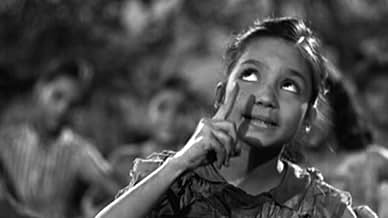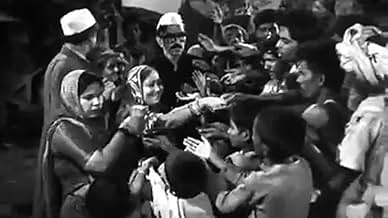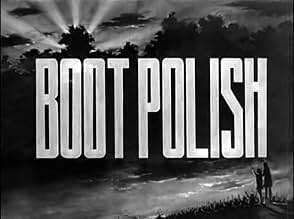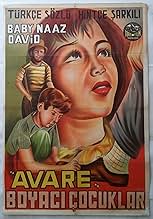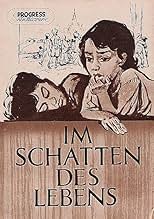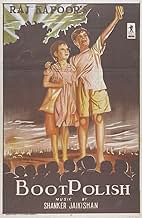Adicionar um enredo no seu idiomaPre-teen brother and sister, abandoned by their father to be taken care of by an abusive prostitute aunt, survive life in an Indian squatters' camp, aided by a friendly cripple, by learning ... Ler tudoPre-teen brother and sister, abandoned by their father to be taken care of by an abusive prostitute aunt, survive life in an Indian squatters' camp, aided by a friendly cripple, by learning to shine shoes instead of begging.Pre-teen brother and sister, abandoned by their father to be taken care of by an abusive prostitute aunt, survive life in an Indian squatters' camp, aided by a friendly cripple, by learning to shine shoes instead of begging.
- Prêmios
- 4 vitórias e 1 indicação no total
Kumari Naaz
- Belu
- (as Baby Naaz)
Ratan Kumar
- Bhola
- (as Rattan Kumar)
David Abraham
- John
- (as David)
Chand Burke
- Kamla Devi
- (as Chand Burque)
Bhudo Advani
- Pedro
- (as Budho Advani)
Raj Kapoor
- Man asleep on train
- (não creditado)
Avaliações em destaque
This is the sort of film which shows both the strengths - and the weaknesses - of classic Bollywood cinema. Conceived and executed more often than not with the mass audience in mind, but hoping to make some serious statements behind all the light entertainment, 'Boot Polish' suffers from being a little too long, as well as possessing an over- simplistic ending. On the plus side there is some great acting by the two young leads and some excellent social comment to be gleaned, conveyed through the fine black and white cinematography. Raj Kapoor, who makes a cameo appearance in the film, apparently saw the first cut of the project, then promptly scrapped a lot of what had been produced to start over again. His presence is perhaps most felt in some the Chaplinesque scenes and reforming sentiments which which surround Belu and John's kindly uncle (Prabhu Arora). The inherent decency of people, and the cinematic pathos of children torn from their guardians are all familiar from some of Chaplin's films.
As some critics have noted the two children, with Uncle's then John's particular insistence on the dignity of labour and disavowal of begging as a way of life, can be seen as symbolising the ambitions and hopes of Young India - which interpretation explains the somewhat naive ending of the film. Despite the distress which overtakes some of the young participants, Boot Polish ends on a note of optimism for the future, presumably echoing the Congress Party's offical line at the time. Before the two reach their just deserts however, and during their struggles to make ends meet and make their boot cleaning business work, there is a more obvious cinematic influence: that of the Italian Neo-Realists, especially Vittorio De Sica, whose own 'Shoe Shine'/'Sciuscià' had appeared in 1946.
While one or two of the songs interspersed through the film might be willingly dispensed with by modern Western audiences, there's one comic number (sung by Uncle in prison with a cell full of bald men) which is priceless and shouldn't be missed. Uncle is a convincing proseyltizer for the national Way Ahead, while a minor disreputable scoundrel in his own right. Less convincingly drawn are the parents who adopt Belu. Their all-round charitable concern reminds one of the childless couple who take Oliver Twist in off the streets, which is a form of symbolic caring rather than one dramatically fulfilling for the reader/viewer.
A word should be said about the excellent performance by Baby Naaz as the young sister Belu, in this her first appearance on screen. Although she only made a handful of films, her talent is amazing (as self aware and as talented as the young Jodie Foster IMHO) and is one of the biggest reasons to see the film.
Taken as a whole, 'Boot Polish' is very entertaining as well as being typical of the time at which it was made. If you enjoy classic Bollywood at close to its best, then this will worth looking out for. Admirers of the great Raj Kapoor will need little persuasion, but those who wish to see a great comic turn by Arora (is this really his only film?) will be advised too.
As some critics have noted the two children, with Uncle's then John's particular insistence on the dignity of labour and disavowal of begging as a way of life, can be seen as symbolising the ambitions and hopes of Young India - which interpretation explains the somewhat naive ending of the film. Despite the distress which overtakes some of the young participants, Boot Polish ends on a note of optimism for the future, presumably echoing the Congress Party's offical line at the time. Before the two reach their just deserts however, and during their struggles to make ends meet and make their boot cleaning business work, there is a more obvious cinematic influence: that of the Italian Neo-Realists, especially Vittorio De Sica, whose own 'Shoe Shine'/'Sciuscià' had appeared in 1946.
While one or two of the songs interspersed through the film might be willingly dispensed with by modern Western audiences, there's one comic number (sung by Uncle in prison with a cell full of bald men) which is priceless and shouldn't be missed. Uncle is a convincing proseyltizer for the national Way Ahead, while a minor disreputable scoundrel in his own right. Less convincingly drawn are the parents who adopt Belu. Their all-round charitable concern reminds one of the childless couple who take Oliver Twist in off the streets, which is a form of symbolic caring rather than one dramatically fulfilling for the reader/viewer.
A word should be said about the excellent performance by Baby Naaz as the young sister Belu, in this her first appearance on screen. Although she only made a handful of films, her talent is amazing (as self aware and as talented as the young Jodie Foster IMHO) and is one of the biggest reasons to see the film.
Taken as a whole, 'Boot Polish' is very entertaining as well as being typical of the time at which it was made. If you enjoy classic Bollywood at close to its best, then this will worth looking out for. Admirers of the great Raj Kapoor will need little persuasion, but those who wish to see a great comic turn by Arora (is this really his only film?) will be advised too.
This is a Hindi language film starring Rattan Kumar and Kumari Naaz.
The film is about the struggle to survive of two children, a brother and sister.
The premise is how after being orphaned, they have to beg to earn money for their guardian, a cruel aunt. And how they rise from that stage to trying to learn a skill and earn money for themselves.
And in my eyes, the film would have been a masterpiece if it had progressed from there to showing how they also get independent and help similar others struggling also to rise. It would have been an inspiring film for the newly independent country.
Instead the film refuses to leave its melancholic and cynical tone and shows that it's difficult for the poor to rise by themselves. A tone that it had set upfront by showing characters in black and white shades than the truly gray shades we all are, especially the aunt.
The message at the end is also very cynical. Where the spirit of the boy is shown as finally broken, and he is then humiliated in front of his own sister.
And the final message that the poor can only be redeemed by the rich!!
The purpose and the point of the film was missed in the melodrama and the film was awarded Best picture in 1954..
I rated it 6/10 in IMDB.
The film is about the struggle to survive of two children, a brother and sister.
The premise is how after being orphaned, they have to beg to earn money for their guardian, a cruel aunt. And how they rise from that stage to trying to learn a skill and earn money for themselves.
And in my eyes, the film would have been a masterpiece if it had progressed from there to showing how they also get independent and help similar others struggling also to rise. It would have been an inspiring film for the newly independent country.
Instead the film refuses to leave its melancholic and cynical tone and shows that it's difficult for the poor to rise by themselves. A tone that it had set upfront by showing characters in black and white shades than the truly gray shades we all are, especially the aunt.
The message at the end is also very cynical. Where the spirit of the boy is shown as finally broken, and he is then humiliated in front of his own sister.
And the final message that the poor can only be redeemed by the rich!!
The purpose and the point of the film was missed in the melodrama and the film was awarded Best picture in 1954..
I rated it 6/10 in IMDB.
This film ranks as one of the finest thought provoking social dramas asking how we look at ourselves given the limited resources and choices and faced with overwhelming odds. Raj Kapoor's presentation of the humble lifestyle of two children who wish to overcome the obstacles of abject poverty shows the importance of the spirit of endurance and dedication in the face of adversity. We can learn from children when they try to face challenges in the world created by greedy souls.
I would recommend this film as a lesson in the triumph of the human spirit when facing the evils of man made adversity. We probably can relate to the two youn protaganists of the film in our everyday lives. Life can be a bitch, and films such as BOOT POLISH show the more dramatic encounters of what we call the human struggle.
I would recommend this film as a lesson in the triumph of the human spirit when facing the evils of man made adversity. We probably can relate to the two youn protaganists of the film in our everyday lives. Life can be a bitch, and films such as BOOT POLISH show the more dramatic encounters of what we call the human struggle.
Boot Polish tells the story of two orphan children - Bholu (Ratan Kumar) and his younger sister, Belu (Naaz). The fostering aunt of theirs is a wicked lady (Chaand Burke) who forces them to beg on the streets. They feel that begging is wrong but don't have any other option. Destiny brings them into contact with a kind-hearted bootlegger - John Chacha (David) who inspires them to lead a life based on hard-work and earn self-respect for them. The innocent children save money and buy a shoe-polish kit . Now they don't beg but earn money by polishing the shoes of the people. Their villainous aunt expels them from the house. The poor children are now under the sky to support themselves by all means. The ill-fate strikes them when first the rainy seasons arrives and people no longer approach them to get their shoes polished. And thereafter, John Chacha gets arrested when he tries to sell liquor to get some money to buy food for these hungry kids. Then starts a chain of heart-piercing incidents bringing about the separation of the brother and the sister. As times change, their fate also takes a twist and they get reunited to lead a better life now.
Boot Polish is a very touching movie and able to move the spectator deep within his / her heart at several places. Any emotional person will find it hard to stop his / her tears while watching this movie. The writer - Bhaanu Prataap, the director - Prakash Arora and the ultimate visionary - Raj Kapoor all have worked in harmony to make it a memorable movie. The movie does not bore at all any place and it can be watched many times. Though more Bollywood movies based on children came later also, this movie is definitely in a league of its own.
However, I have some reservations about this movie, mainly its script. Begging and moreover the begging of the children (who are actually forced by the grown-up ones behind the sight) has always been a great problem in India. It was there when Boot Polish was made and it is there when this review is being written. Frankly, several boot-polishing children found on the railway stations and the scavenging children seen in the train are no different from the beggars. This is the real, ugly face of the so-called shining India. And when this movie was made, India was not shining even on paper. Hence the script-writers could have done better by focusing the story on this issue only. However the track of first begging and then shoe-polishing of the children is short and the major footage has gone to the other happenings in their life. I, therefore, felt that the filmmaker's motive was more to exploit the sentiments of the audience and less to draw attention to a burning issue. The problems of the children have been resolved in the climax in an utterly filmy way which seldom happens in real life.
All the same, I have no hitch in admitting that quality-wise this black and white movie is by all standards, a very superior movie. True to the repute of the R.K. Banner, this movie scores in all the departments - may it be the art direction or the cinematography or the acting or the background score or the music- everything is superb. Just superb ! The movie belongs to the child artists - Master Ratan Kumar and Baby Naaz and both have delivered performances of a life time. They make you smile, they make you weep. Mainly, it's them which makes this movie a winner all the way. The viewer is bound to lose his / her heart to these innocent faces and their innocent mannerisms. Among others, seasoned artist - David deserves a special mention. He never acted badly throughout his career and Boot Polish is a showcase of his abundant talent.
Raj Kapoor's permanent music directors - Shankar Jaikishan have composed memorable melodies including Chali Kaun Se Des Gujariya Tu Saj Dhaj Ke (Talat Mahmood - Asha Bhosle), Lapak Jhapak Tu Aa Re Badarwa (Manna Dey), Tumhaare Hain Tumse Daya Maangte Hain (Asha Bhosle - Mohammad Rafi), Raat Gayi O Raat Gayi Phir Din Aata Hai (Asha - Manna Dey), Theher Zara O Jaanewaale (Asha - Madhubala Jhaveri - Manna Dey), Taaron Ko Dil Ki Baat Sunaaye (Asha), Saari Duniya Hai Mujhpe Deewaani (Asha) etc. with the beautiful lyrics penned by Shailendra and Hasrat Jaipuri. But the song which is definitely immortal is - Nanhe Munne Bachche Teri Mutthi Mein Kya Hai.
I recommend this great movie to one and all who are interested in watching socially relevant quality cinema. I hope against hope that things will improve for the innocent unsupported children in our country with the efforts of us all humming the following lines of the song Nanhe Munne Bachche Teri Mutthi Mein Kya Hai - 'Aane Waali Duniya Mein Sabke Sar Pe Taaj Hoga, Na Bhookhon Ki Bheed Hogi Na Dukhon Ka Raaj Hoga, Badalega Zamaana Ye Sitaaron Pe Likha Hai...'
Boot Polish is a very touching movie and able to move the spectator deep within his / her heart at several places. Any emotional person will find it hard to stop his / her tears while watching this movie. The writer - Bhaanu Prataap, the director - Prakash Arora and the ultimate visionary - Raj Kapoor all have worked in harmony to make it a memorable movie. The movie does not bore at all any place and it can be watched many times. Though more Bollywood movies based on children came later also, this movie is definitely in a league of its own.
However, I have some reservations about this movie, mainly its script. Begging and moreover the begging of the children (who are actually forced by the grown-up ones behind the sight) has always been a great problem in India. It was there when Boot Polish was made and it is there when this review is being written. Frankly, several boot-polishing children found on the railway stations and the scavenging children seen in the train are no different from the beggars. This is the real, ugly face of the so-called shining India. And when this movie was made, India was not shining even on paper. Hence the script-writers could have done better by focusing the story on this issue only. However the track of first begging and then shoe-polishing of the children is short and the major footage has gone to the other happenings in their life. I, therefore, felt that the filmmaker's motive was more to exploit the sentiments of the audience and less to draw attention to a burning issue. The problems of the children have been resolved in the climax in an utterly filmy way which seldom happens in real life.
All the same, I have no hitch in admitting that quality-wise this black and white movie is by all standards, a very superior movie. True to the repute of the R.K. Banner, this movie scores in all the departments - may it be the art direction or the cinematography or the acting or the background score or the music- everything is superb. Just superb ! The movie belongs to the child artists - Master Ratan Kumar and Baby Naaz and both have delivered performances of a life time. They make you smile, they make you weep. Mainly, it's them which makes this movie a winner all the way. The viewer is bound to lose his / her heart to these innocent faces and their innocent mannerisms. Among others, seasoned artist - David deserves a special mention. He never acted badly throughout his career and Boot Polish is a showcase of his abundant talent.
Raj Kapoor's permanent music directors - Shankar Jaikishan have composed memorable melodies including Chali Kaun Se Des Gujariya Tu Saj Dhaj Ke (Talat Mahmood - Asha Bhosle), Lapak Jhapak Tu Aa Re Badarwa (Manna Dey), Tumhaare Hain Tumse Daya Maangte Hain (Asha Bhosle - Mohammad Rafi), Raat Gayi O Raat Gayi Phir Din Aata Hai (Asha - Manna Dey), Theher Zara O Jaanewaale (Asha - Madhubala Jhaveri - Manna Dey), Taaron Ko Dil Ki Baat Sunaaye (Asha), Saari Duniya Hai Mujhpe Deewaani (Asha) etc. with the beautiful lyrics penned by Shailendra and Hasrat Jaipuri. But the song which is definitely immortal is - Nanhe Munne Bachche Teri Mutthi Mein Kya Hai.
I recommend this great movie to one and all who are interested in watching socially relevant quality cinema. I hope against hope that things will improve for the innocent unsupported children in our country with the efforts of us all humming the following lines of the song Nanhe Munne Bachche Teri Mutthi Mein Kya Hai - 'Aane Waali Duniya Mein Sabke Sar Pe Taaj Hoga, Na Bhookhon Ki Bheed Hogi Na Dukhon Ka Raaj Hoga, Badalega Zamaana Ye Sitaaron Pe Likha Hai...'
I must admit I've always enjoyed the films of Raj Kapoor especially from his early golden period, but can find his moralising laid on a little heavy at times. He took the best pathos and melodrama from Chaplin and spun it out relentlessly. As in Boot Polish. It's not that I can argue with any of his philosophising and moral instruction, just that history has proved Film itself will never change the social system; it never brings shame to the faces of our Betters, but it probably would just make them wonder how much more they can turn the screws on us. After all, Film represents an entertainment they have paid their paisa or pennies for us to waste production time watching.
Two young children are orphaned and thrown onto the not so tender mercies of their scolding prostitute aunt and nice but drunken uncle in a Mumbai slum. She teaches them to beg for a living, he tries to teach them of the better, honest and more painful way, in their case the complicated profession of polishing other people's boots. It's done very well, and if it wasn't for the comedy and the songs almost neo-realist - RK even makes a fag-in-cheek cameo at the beginning. To beg or not to beg, that is the question - but the pain of surviving the slings and arrows of capitalism goes on and on for the children, although their destitute situation does eventually improve. Baby Naaz must have been very young but she provided a marvellously believable performance. My favourite bit though amidst all the grinding poverty is the energetic comic raag Lapak Jhapak To Aare Badarwa sung by Manna Dey for the uncle and his fellow bald headed companions in jail – delicious stuff! I always wondered whether bits like these were particularly edited out in the Russian versions?
Needless to say self-sacrifice and self-effacement bring their reward - so basically it's another rewarding film from RK, an expertly produced moral melodrama.
Two young children are orphaned and thrown onto the not so tender mercies of their scolding prostitute aunt and nice but drunken uncle in a Mumbai slum. She teaches them to beg for a living, he tries to teach them of the better, honest and more painful way, in their case the complicated profession of polishing other people's boots. It's done very well, and if it wasn't for the comedy and the songs almost neo-realist - RK even makes a fag-in-cheek cameo at the beginning. To beg or not to beg, that is the question - but the pain of surviving the slings and arrows of capitalism goes on and on for the children, although their destitute situation does eventually improve. Baby Naaz must have been very young but she provided a marvellously believable performance. My favourite bit though amidst all the grinding poverty is the energetic comic raag Lapak Jhapak To Aare Badarwa sung by Manna Dey for the uncle and his fellow bald headed companions in jail – delicious stuff! I always wondered whether bits like these were particularly edited out in the Russian versions?
Needless to say self-sacrifice and self-effacement bring their reward - so basically it's another rewarding film from RK, an expertly produced moral melodrama.
Você sabia?
- CuriosidadesThis movie is a remake of Italian movie "Shoeshine". But Raj Kapoor shaab made it in Indian style.
- ConexõesRemade as Morad o Laleh (1966)
- Trilhas sonorasRaat Gayi
Music by Shankarsingh Raghuwanshi & Jaikishan Dayabhai Panchal
Principais escolhas
Faça login para avaliar e ver a lista de recomendações personalizadas
- How long is Boot Polish?Fornecido pela Alexa
Detalhes
- Tempo de duração
- 2 h 29 min(149 min)
- Cor
- Proporção
- 1.37 : 1
Contribua para esta página
Sugerir uma alteração ou adicionar conteúdo ausente

